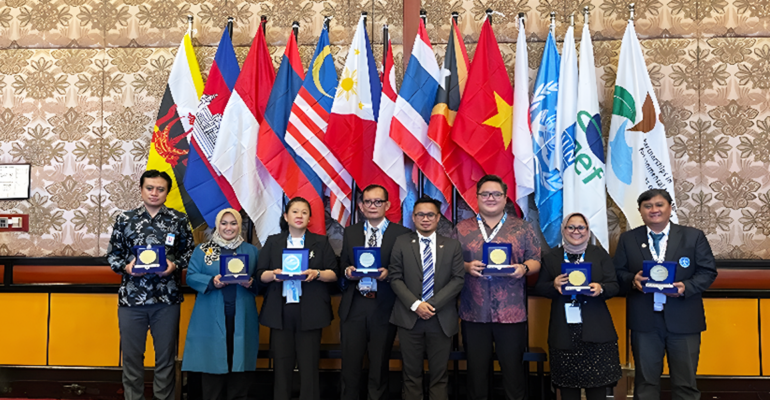IPB University Lecturer Represents Indonesia in the 3rd Regional Task Force Meeting on Biofouling Management and Aquatic Invasive Species in the East Asian Sea

IPB University lecturers, Dr Mochammad Riyanto and Dea Fauzia Lestari SIK, MSi represented Indonesia at the 3rd Regional Task Force Meeting on Biofouling and Aquatic Invasive Species in the East Sea of Asia. Each of them presented a report on Indonesia’s progress regarding the development of biofouling management and the results of research on the Port Biological Baseline Survey and the potential for invasive species in port areas in Indonesia.
This regional meeting was organized by the International Maritime Organization (IMO) in collaboration with the Partnerships in Environmental Management for the Seas of East Asia (PEMSEA) at the Sheraton Hotel Surabaya, Indonesia (20-22/9). The activity aims to discuss reports from each country regarding the development of biofouling management in each member country and determine the draft Regional Strategy on Biofouling Management in the East Asian Seas (EAS) Region which has been prepared by PEMSEA.
On the first day, Dr Mochammad Riyanto, IPB University lecturer from the Department of Fisheries Resources Utilization, Faculty of Fisheries and Marine Sciences (FPIK) IPB University explained the results of the National Economic Rapid Assessment of Biofouling Management and Invasive Aquatic species of Indonesia study which had been carried out for one year studies.
He explained that the assessment of the economic impact of biofouling on the maritime industry in Indonesia covers 7 industrial sectors, including maritime transportation, ports, aquaculture, capture fisheries, offshore mining, recreational vessels and marine tourism.
“Hopefully by assessing the economic impact of all countries, especially in ASEAN, it can be brought to attention that if managed with several strategic policies, the impact of biofouling at the global, regional and national levels can be reduced,” he said.
Dr Lilia Khodjet, IMO Project Technical Manager welcomed the results of this study. According to her, this is the first study conducted by a country in ASEAN. The study results can be used as a basis for preparing the National Strategic and Action Plan of Biofouling Management. Likewise, Dr Aimee Gonzales from PEMSEA said, this study could be a lesson for other countries in ASEAN in carrying out economic assessments of biofouling.
On the second day, Dea Fauzia Lestari SIK, MSi as a lecturer at the Department of Marine Science and Technology at IPB University presented the results of research on the Port Biological Baseline Survey and the potential for invasive species in port areas in Indonesia. This research was carried out in 2019 and 2021.
“Identification of biota in ports is important as a database for managing biofouling and invasive biota, as well as material for the Same Risk Area concept between Indonesia and the two neighboring countries, namely Malaysia and Singapore,” she said.
The regional strategy and action plan were accepted by all members and will be brought to the IMO R&D meeting forum in Busan, South Korea in 2024.
Dr Hartanto, Director of Shipping and Maritime Affairs, Directorate General of Sea Transportation, Ministry of Transportation who acted as chairman of the meeting explained the importance of biofouling management in ASEAN countries. He also emphasized the need for strategies and action plans that could serve as a reference for each country.
The activity was attended by 12 country delegations, namely from Indonesia, Malaysia, Singapore, Thailand, Philippines, Vietnam, Laos, Brunei Darussalam, Cambodia, Timor Leste, Japan and South Korea. Other participants who joined from non-government partners were from IMO, PEMSEA, SDS Test, Global Test Net and Blustreak. (IAAS/YMK)



